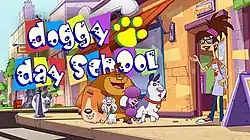Doggy Day School
Doggy Day School is a Brazilian-Canadian flash-animated children's television series created by Cathy Moss, who also created Franny's Feet.
| Doggy Day School | |
|---|---|
 The main characters from left to right: Lucas, Suki (in back), Lucas (in front), Lili, Koda, and Rosie. | |
| Created by | Cathy Moss |
| Written by |
|
| Directed by |
|
| Voices of |
|
| Composers |
|
| Country of origin |
|
| No. of seasons | 2 |
| No. of episodes | 52 |
| Production | |
| Executive producers |
|
| Producers |
|
| Editor | Thiago Salerno |
| Running time | 11 minutes[1][2] |
| Production companies | |
| Release | |
| Original network | Nickelodeon |
| Picture format | HDTV 1080i |
| Audio format | Stereo |
| Original release | 12 October 2009[3] – 2011 |
| Chronology | |
| Related shows | Doki Fishtronaut My Big Big Friend Trunk Train |
| External links | |
| Production website | |
It debuted on Nickelodeon in Brazil on 12 October 2009.[3]
Premise
Doggy Day School revolves around five dogs, Lucas, Lili, Koda, Suki, and Pedro, who go to a day school owned by Rosie every morning. The group of puppies learn about each other and the world they live in, all while having various adventures together.[2][4]
Characters
Main
- Lucas (voiced by Sonja Ball) is a dalmatian dog, and the mascot of the group. He is easily excitable and curious, even in the most serious situations.[5]
- Lili (voiced by Angela Galuppo) is a charming and delicate miniature poodle. Sometimes she gets bossy, and she loves to gossip. She is also full of fun ideas.[5]
- Koda (voiced by Mark Hauser) is a Siberian Husky who loves adventure. He has a big imagination and a desire to become a superhero.[5]
- Suki (voiced by Sonja Ball) is a Newfoundland dog. She is very docile and sensitive, as she is always willing to help the other puppies.[5]
- Pedro (voiced by Mark Hauser) is a beagle dog. He is the intelligent street dog of the group, and he loves to eat biscuits.[5]
- Rosie (voiced by Kaniehtiio Horn) is the owner of the day school who looks after the pets.
Recurring
- Vlad (voiced by Mark Hauser) is a stunt dog movie star who frequently visits the daycare and demonstrates his tricks for the group.
- Daisy is an Afghan. She appears in the episode "Best in Show".
Episodes
Season 1 (2009)
- Pig Deal
- Small is Beautiful
- Sports Day
- Do the Itch
- Super Koda
- Diamond Lily
- Hidden Talent
- Pedro's Secret
- Oodles of Poodles
- Food for Thought
- Bath Time
- Koda and the Three Bears
- Cone Head
- The Magic Lamp
- Best in Show
- Patience, Lucas
- Bossy Boots
- Rosie's Gift
- The Runaround
- Something's Fishy
- Zippy the Turtle
- Good Enough
- My First Day at School
- Let's Get Ready
- Dogs with Jobs
- Visit to the Vet
Season 2 (2010-2011)
- Pedro's Faux Paw
- The Misunderstanding
- Sorry Story
- Dedective Dogs
- The New Substitute
- Unfair Trade
- Star Trouble
- Robot Dog
- Giggly Pig
- Pedro's Pretend
- Cat on the Mat
- Pirate Vlad
- Heroic Rescue
- Share Affair
- Too Hot to Trot!
- Silent Lucas
- Lucas saves the Day
- Mixed Biscuits
- Where is Rosie's Hat?
- Fish sees the World
- Carnival
- Home for Hank
- Little Lucas
- An Cheater in the Pack
- Lili and Lulu
- The Big Change
Broadcast
Doggy Day School debuted on Nickelodeon in Brazil on 12 October 2009, however the series was dubbed in Brazilian Portuguese. The series aired in its original English-language version on TVOKids, Knowledge Kids and the Aboriginal Peoples Television Network in Canada from 2010 to 2019.
References
- "Doggy Day School – Attraction Distribution". attractiondistribution.ca. 3 March 2016.
- "Escola para Cachorro (Doggy Day School) – Mixer Films". mixer.com.br.
- "Toon Boom Sets Up Doggy Day School Pipeline". animationmagazine.net. 1 October 2009.
- "Doggy Day School". knowledgekids.ca. 15 April 2016.
- "Escuela para Perros Episodios Completos y Clips – Mundonick Latinoamérica". mundonick.com.
External links
- Doggy Day School on Mixer Films
- Doggy Day School at IMDb
This article is issued from Wikipedia. The text is licensed under Creative Commons - Attribution - Sharealike. Additional terms may apply for the media files.